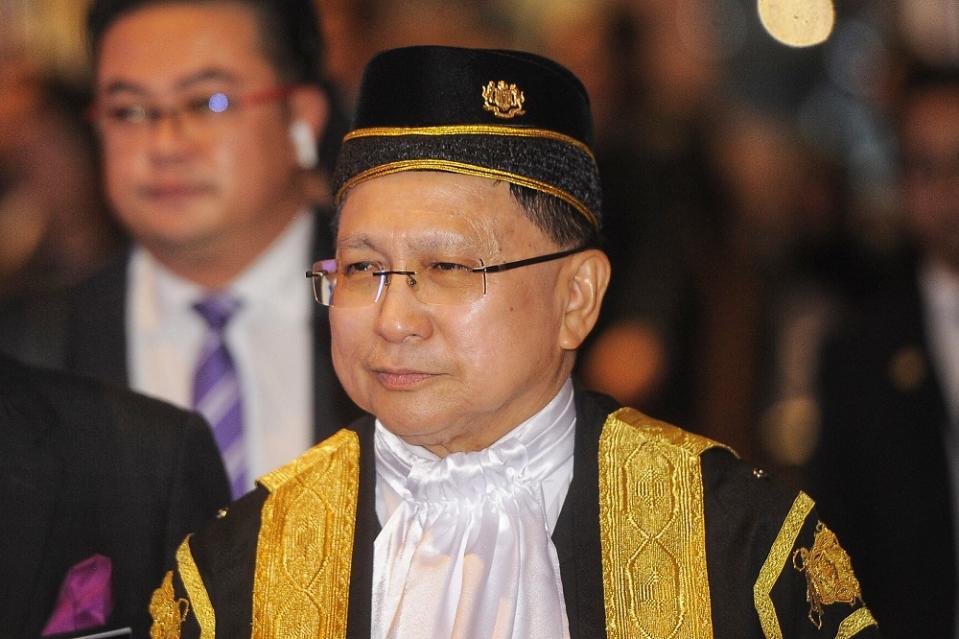PBK chief to renew bid to block ex-CJ Malanjum from being lawyer in Sarawak

KUCHING, April 15 — Parti Bumi Kenyalang (PBK) president Voon Lee Shan today said he has instructed his lawyer to appeal the High Court’s dismissal of his lawsuit against the admission of former Chief Justice Tan Sri Richard Malanjum, a Sabahan, as an advocate in Sarawak.
He said the question of whether a non-Sarawakian may be a member of the Sarawak Bar must be ventilated all the way to the Federal Court, if necessary, as it is fundamental issues of rights of Sarawakians and non-Sarawakians admission to the Sarawak Bar.
“PBK will at all times protect Sarawak rights and we urge Sarawakians to stand firmly behind,” he said in a statement when responding to Sarawak DAP chairman Chong Chieng Jen’s defence of Malanjum’s admission.
Voon, who is also a practising lawyer, claimed Chong erred in reading or could not understand Section 2(2) of the Advocates Ordinance of Sarawak in respect of the term “Sarawak Connection.”
He said “Sarawak connection” as defined in section 2(2) of the Ordinance did not include the judgments or work experience of Malanjum when he was the Chief Judge of Sabah and Sarawak before appointed as the Chief Justice of Malaysia.
“His favourable judicial pronouncements on the native customary rights (NCR) issues did not entitle him to have Sarawak connection to be admitted to the Sarawak Bar.
“The admission to Sarawak Bar is primarily premised on the residential requirements under section 2(2) of the Ordinance, meaning that Malanjum must reside in Sarawak for a minimum of five years or more or he is domiciled in Sarawak as he is not Sarawak born.
“Whatever works he had done for the judiciary are good, but he did it as part of his job as the Chief Judge of Sabah and Sarawak and was paid by the government,’ he said.
He added the Ordinance did not include the official duties of the judiciary to be a factor to be considered without the residential qualification for the purpose of admission to the Sarawak Bar.
In a statement yesterday, Chong said there might be some who disagreed with Malanjum’s admission to the Sarawak Bar, but it was his view that the Sabahan had done enough for the good of the judicial system in Sarawak and the interests of the people to satisfy the “Sarawak connections” which is the key consideration for admission to the Sarawak Bar.
He said when Malanjum was the Chief Judge of Sabah and Sarawak he had brought many reforms in the Court’s management, citing the implementation of e-court and e-filing system as examples.
He also said Malanjum had delivered many judgments in the defence of Sarawak’s Native Customary Rights (NCR) landowners in the face of oppression by the state laws.
He said he was certain that Malanjum’s admission to the Sarawak Bar will surely help in the fight of the oppressed NCR landowners against the power that be.
“The admission will add to the pool of Sarawak lawyers fighting for the NCR landowners who have been displaced from their own land by the state government.
On April 12, the High Court here dismissed Voon’s fresh originating summons against Malanjum’s admission as an advocate in Sarawak.
Judicial Commissioner Alexander Siew affirmed an earlier decision of Chief Judge of Sabah and Sarawak Datuk Abang Iskandar Abang Hashim on Sept 15, 2020 in admitting Malanjum into the Sarawak Roll of Advocates following no objection from the Advocates Association of Sarawak.
Voon’s intervener petition to get a court declaration on Malanjum’s admission to the Sarawak Bar was dismissed because Malanjun had complied with provisions that he has “Sarawak connection”.
The Advocates Ordinance 1953 states only those with Sarawak connection can practise in Sarawak and a person is deemed to have Sarawak connection if they are born in the state, have been a resident here for a continuous period of five years or more, and are domiciled in Sarawak.
Related Articles Senari Port still not fully operational despite Kuching Port Authority’s claim, says Sarawak DAP chief Sarawak DAP chairman welcomes High Court’s decision to admit Malanjum to the Roll of advocates in the state As daily cases rise, Sarawak Pakatan urges state to buy its own Covid-19 vax


